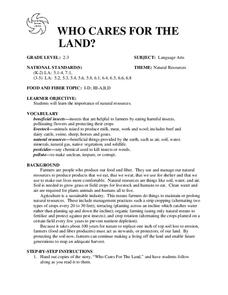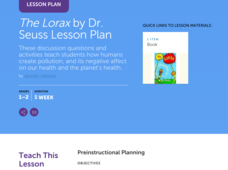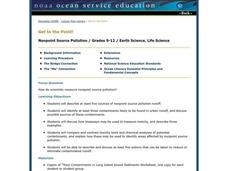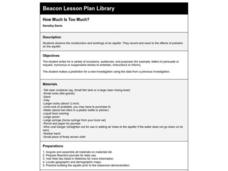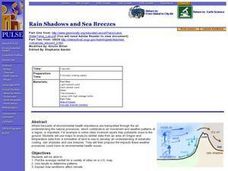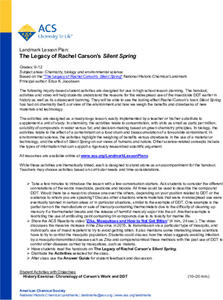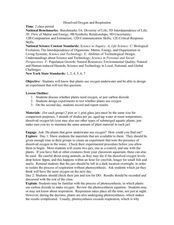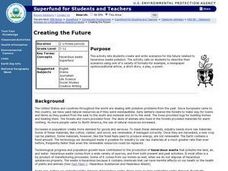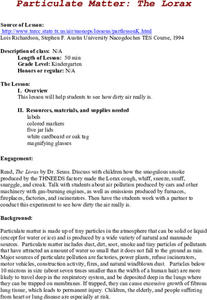Curated OER
Runoff: Intro to Watersheds
Learners are taught that a watershed is, what types of basic land cover are impermeable and permeable to water. They trace the flow of water around their school and around their home. Students determine what watershed their school is a...
Curated OER
How Much Water is in That River?
Students practice measurement using the Hudson River. They calculate the discharge measurement at a location on the Hudson River using ingenuity and a topographic map.
Curated OER
Air, Air Everywhere! Lesson 2: Acid Rain
Middle school environmentalists record the pH of four different liquids, including two aerosol cleaning products. They liken the products to acid rain and speculate in writing which might affect the human respiratory system. Although...
Curated OER
Rock River Watershed
Students discover what a watershed is and which one they live in. Using the internet, they research why watersheds are important to an ecosystem and how to keep them from getting polluted. They use a map to locate various items within a...
Curated OER
CO Buildup City
Students conduct a controlled experiment. They collect data in an organized manner. Students analyze data to reach a conclusion and communicate findings. They explain how city size, temperature, and pollution is related to the air quality.
Curated OER
WHO CARES FOR THE LAND?
Students explore the importance of natural resources. They are given copies of the story, "Who Cares For The Land," and students follow
along as the teacher reads it. Students identify the key points in the story. (Soil, water and air...
Curated OER
Keep the Environment Clean
Students discuss ways our environment becomes polluted. They make a list of ways to keep it clean.
Curated OER
Weather Watchers
Students study basic meteorology concepts. They build a simple barometer to measure air pressure. They explore the concepts of relative humidity, air convection currents and temperature inversions and to discover their connection to...
Scholastic
The Lorax by Dr. Seuss Lesson Plan
Celebrate the whimsical world of Dr. Seuss with a lesson plan that features the memorable tale of The Lorax. After listening to a riveting read-aloud, scholars take part in a grand conversation about the story and environment. Then they...
Curated OER
Get to the Point!
Students write out sources of pollution and identify contaminants are most likely found in urban runoff. In this pollution lesson students compare toxicity tests and chemical analysis of potential contaminants.
Curated OER
The Environment and the Community
Students observe their environment and come up with ways to protect it. In this environment lesson plan, students discuss pollution and ways to prevent it. Then they create a poster with drawings that show a goal to reduce pollution and...
Curated OER
HOW MUCH IS TOO MUCH?
Students observe the construction and workings of an aquifer. They record and react to the effects of pollution on the aquifer.
Curated OER
Rain Shadows and Sea Breezes
Students plot the average rainfall for a variety of cities in the United States. Using the map, they work together to determine patterns on which toxicants are transported through the air. They determine the impacts of various weather...
Curated OER
Rain, Rain, Go Away
Students conduct a number of experiments involving evaporation and condensation. They view and discuss a video about the water cycle and then design posters about the rain based on the book "Cloudy With A Chance of Meatballs".
Curated OER
Where Does Al the Waste Go?
Students construct a sanitary mini-landfill and an open mini-dump. Over a thirty day period, they compare the two methods and determine landfills are envorinmentally safer. They observe a demonstration of burning waste. They create...
Curated OER
Global Change — Change and Cycles Where Land, Air and Water Meet
Students participate in an experiment to define a parts-per-billion solution. For this ecology lesson, students select a second substance to create a parts-per-billion solution and observe and record their results. Students work in...
American Chemical Society
The Legacy of Rachel Carson’s Silent Spring
How do we protect crops and protect the environment at the same time? Using reading materials, learners explore the history of the use of pesticides and biocides. They create a timeline and then explore the current practices.
Curated OER
Acid Rain
Students investigate acid rain. In this environmental lesson, students participate in an experiment using litmus paper and various liquids and then test the acidity of the liquids. Students identify reasons why acid is harmful to the...
Curated OER
Dissolved Oxygen and Respiration
Students are presented with the question, "Do plants that grow underwater use oxygen?" They create an experiment to test the presence of dissolved oxygen in the water using provided materials. Student experiments include a control jar as...
Curated OER
Tides in the Hudson
Students view an illustration of the Hudson River watershed and identify the bodies of water shown. They discuss what happens when fresh and salt water mix. Students view a teacher demonstration of the stratification of fresh and salt...
Curated OER
Acid Rain Keeps Falling on My Head
Students examine the pH level of rain water in their local community. They locate each location on a map. They analyze the data and draw conclusions.
Curated OER
Rice Farming
Third graders investigate how farmers get more rice from their land. In this farming instructional activity, 3rd graders discover things that farmers to do produce more rice. Students study photosynthesis and illustrate pictures about...
Curated OER
Creating the Future
Students work together to develop and write scenerios for the future of hazardous waste cleanup. They share their scenerios with the class. They complete activities as well.
Curated OER
Particulate Matter: The Lorax
Students investigate how dirty air is outside. They read and discuss the book, The Lorax, by Dr. Seuss. They investigate using jars and lids to compare the dirt left each day as they remove the lids. They observe the lids and discuss if...







